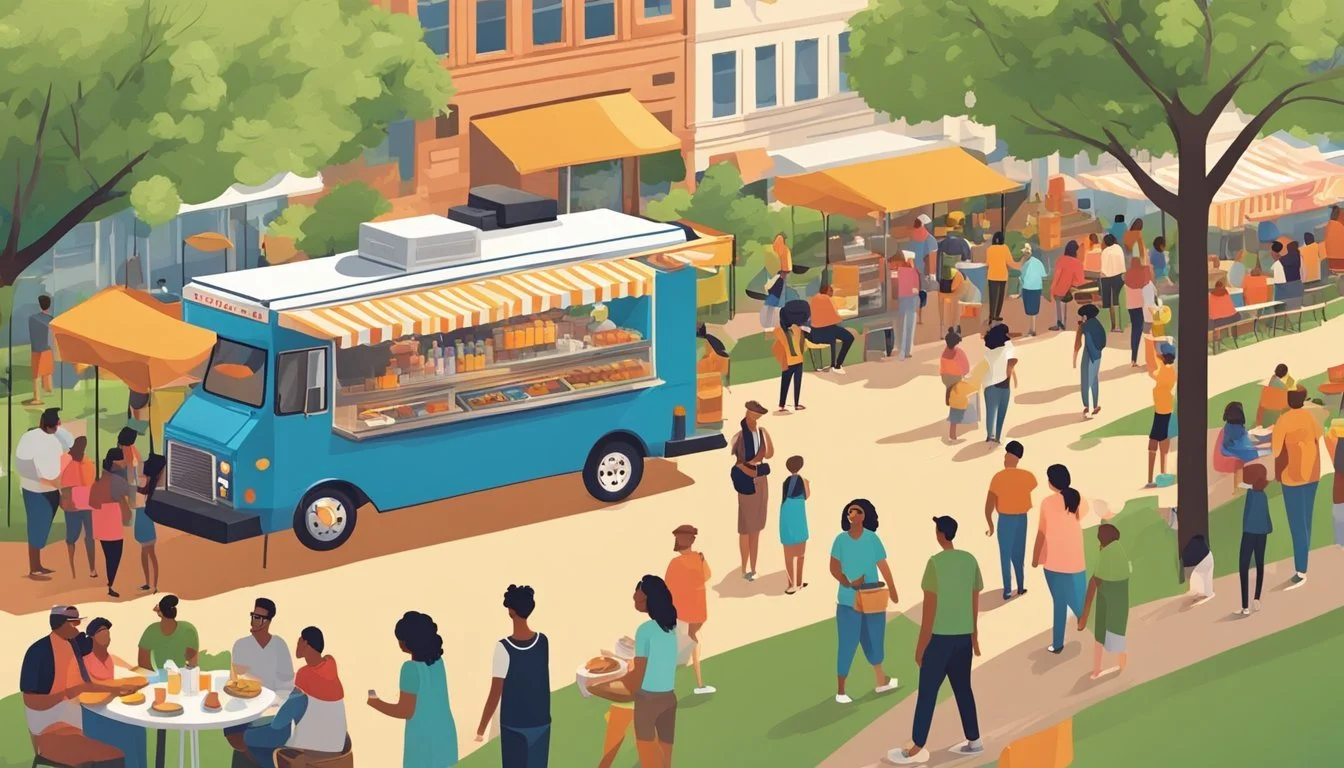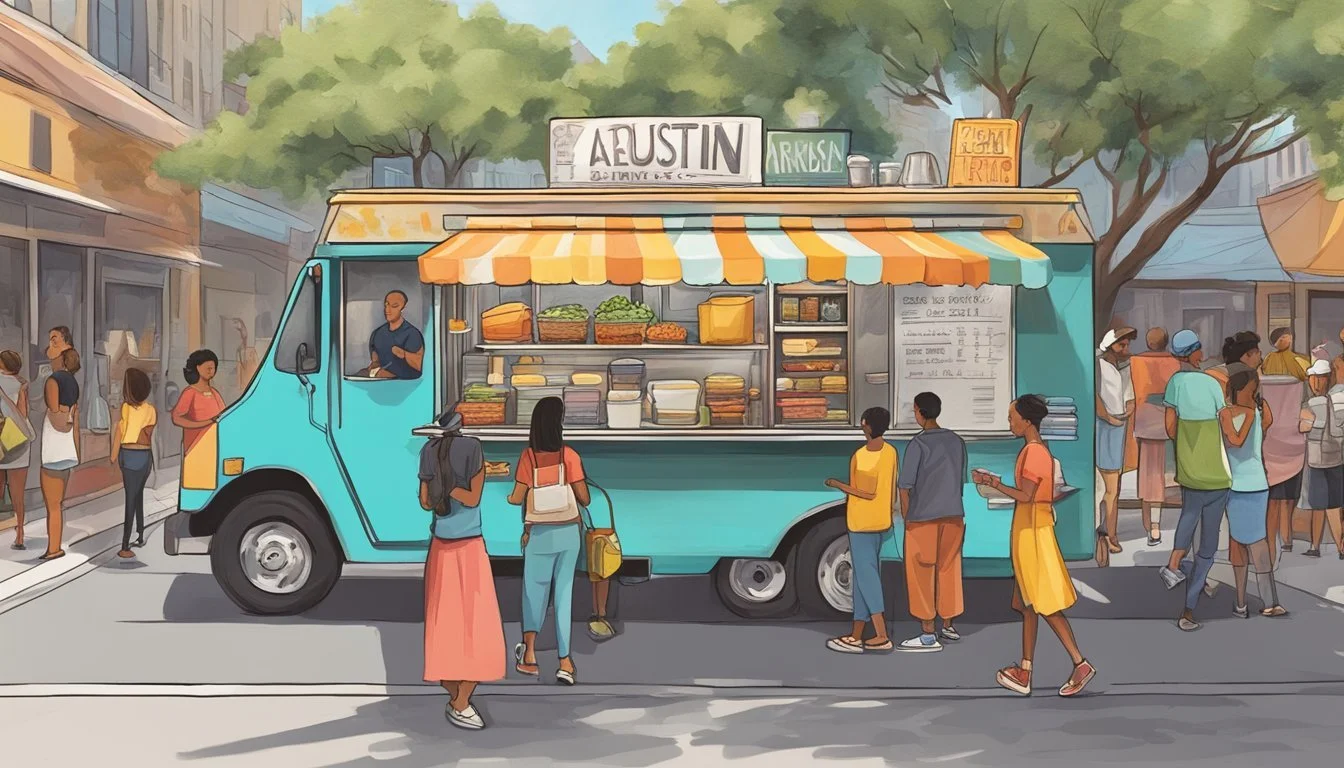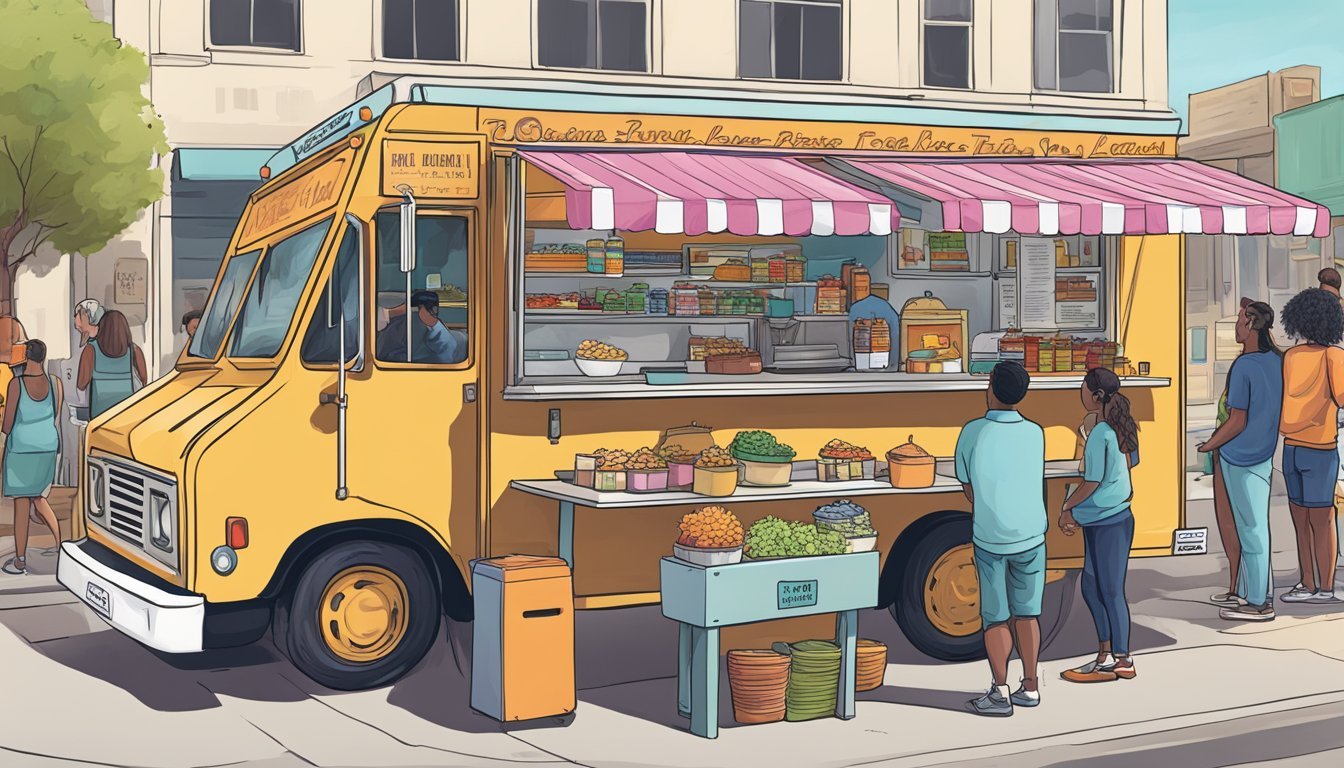Food Truck Laws Austin, Texas
Navigating Regulations for Mobile Vendors
Austin, Texas has a vibrant food truck culture that enriches both its culinary scene and local economy. Regulations governing mobile food vendors in Austin are vital for maintaining food safety, protecting consumer health, and ensuring that vendors operate on a level playing field. These laws cover a range of issues from permitting and inspections to operational standards, influencing how food trucks operate within the city's limits.
The City of Austin regulates mobile food vendors with guidelines that are designed to ensure proper food safety and compliance with health regulations. Vendors are required to have valid permits and must adhere to the Texas Food Establishment Rules (TFER), which provide clear directives on food handling, preparation, and storage.
Navigating the legal requirements can be a significant undertaking for food truck owners. They must ensure they have all the proper permits and follow city and county rules, such as operating only in designated areas and adhering to pre-set operational hours. Compliance with these rules helps sustain the reputation of food trucks in Austin as safe and reliable sources of a diverse array of foods.
Getting Started with Food Trucks in Austin
Austin, Texas, offers a vibrant culinary scene, and food trucks are a fundamental part of this landscape. Entrepreneurs looking to launch a mobile food business must navigate city regulations and decide on the type of mobile food unit that suits their operations.
Understanding City of Austin Regulations
The City of Austin requires all mobile food vendors to comply with specific regulations to ensure food safety and community standards. Before one can begin operating a food truck, they must obtain the appropriate permits. These include a Mobile Food Vendor Permit and possibly additional ones, like a Special Event Closure permit if the food truck will operate in the public right-of-way. The checklist provided by the Mobile Food Vendor Pre-Application Checklist details all the steps, including selecting the right permit type and understanding associated fees.
For any concerns or to request a second opinion regarding an inspection result or complaint, vendors should contact the Environmental Health Services division at the Austin Public Health Department.
Selecting a Mobile Food Unit Type
In Austin, mobile food units encompass a variety of structures. Entrepreneurs may choose:
Food Trailers: These are often more extensive and equipped with more amenities.
Motor Vehicles: Adapted vehicles like food trucks can often move more freely throughout the city.
Pushcarts: These are suitable for more manageable operations, often with a limited menu.
Kiosks: Typically found indoors, such as in malls or office buildings.
Each type of mobile food establishment has its requirements and restrictions. It is crucial to understand what each entails and to choose the one that aligns best with one's business goals and the logistical capacity, such as space for the unit and the proximity to utilities like water and electricity. The appropriate type of permit will largely depend on the mobile unit chosen; resources like the Food Truck Permit and Inspection page can give insights into what is required for each unit type.
Initial Setup and Compliance
For entrepreneurs venturing into the mobile food industry in Austin, Texas, compliance with local regulations from the onset is crucial. Adhering to the rules ensures that food trucks operate legally and safely, addressing requirements from the necessary permits to health and safety protocols.
Obtaining Necessary Permits
Food truck operators in Austin must secure various permits, including city and/or Travis County Mobile Vending permits. The process involves contacting Austin's Public Health Department to begin the permitting process, which may include submitting detailed information about the operation. Every food truck requires a Food Manager with up-to-date certification, ensuring they understand food safety and health guidelines.
Health and Safety Inspections
The initial setup involves a mandatory initial inspection by public health officials to confirm adherence to safety standards. Food trucks must be equipped to store, prepare, display, serve, and sell food in a manner that prioritizes consumer health. This includes having proper waste disposal systems and clean water sources. Regular inspections continue throughout the food truck's operation to maintain compliance.
Central Preparation Facility Requirements
All food trucks in Austin must operate from a Central Preparation Facility (CPF), which serves as a base for food prep behind the scenes. Requirements for a CPF include adequate storage space for food and non-food items, a place for cleaning and servicing food trucks, and proper venues for food handlers to manage food safely. The CPF must pass its own set of health and safety inspections and is subject to regular compliance checks by the health department.
Operational Best Practices
To ensure compliance and excellence, food truck operators in Austin, Texas, should adhere to stringent guidelines concerning food safety and equipment maintenance. These best practices not only keep the community safe but also enhance the reputation and efficiency of the food service operation.
Food Handling and Menu Planning
When designing a menu, food truck operators must consider food safety and water use. Each item should be easily prepared in the truck's limited space while ensuring cross-contamination is avoided. All staff members involved in food preparation should have updated food manager certifications and be well-versed in proper food handling techniques. The menu planning should also take into account refrigeration requirements to keep ingredients fresh and safe for consumption.
Waste management strategies are essential to maintain a clean preparation environment and should follow local health regulations. It is crucial to have a plan for disposing of both solid and liquid waste, especially used water, to prevent contamination and pests.
Vehicle and Equipment Maintenance
Regular maintenance of the food truck is critical for safe operation. This includes ensuring the clean supply of water for cooking and cleaning, as well as the regular inspection and repair of all cooking and refrigeration equipment to prevent food spoilage or fire hazards.
Food trucks must be kept in good repair and clean condition to serve food safely. Every service point, from window to commercial kitchen equipment, needs to be regularly checked to ensure they are working properly and efficiently. Any sign of equipment malfunctioning must be attended to promptly to avoid business interruptions and potential health risks.
Parking and Location Strategies
Selecting the right parking and location for a food truck in Austin is critical. Owners must understand the local vending locations and adhere to the specific zoning and parking ordinances laid out by the City of Austin.
Understanding Vending Locations
In Austin, food truck operators should explore areas that have high foot traffic. This includes streets near office buildings, parks, and popular entertainment districts. Designated spaces for food trucks are spots that the city has marked as appropriate for vending. It’s paramount that operators ensure the parking space they choose is not within a certain distance from existing storefronts, as to not infringe on their business.
Navigating Austin's Zoning and Parking Regulations
The Austin Transportation Department plays a significant role in regulating where food trucks can park. There are clear ordinances in place that dictate the usage of parking spaces and sidewalks. When attempting to secure a location, it’s vital for food truck owners to:
Obtain a Special Event Closure permit for vending in the right-of-way. Food Truck Permit and Inspection
Stay informed about the city’s zoning laws, which impact where a food truck can be legally operated.
Ensure that parking spots do not obstruct pedestrian pathways or access to existing store fronts.
Adhere to the regulations prescribed by the City of Austin, which include the placement of tables and chairs if intending to create a seating area adjacent to the food truck.
Operators must carefully evaluate potential locations to safeguard their business against violating these local laws, which could lead to fines or the revocation of permits.
Regular Compliance and Renewals
In Austin, Texas, food truck operators must adhere to stringent regulations to ensure public health and safety. Regular renewal of health permits and adherence to fire safety standards are critical for continued compliance with city and state regulations.
Health Permit Renewal
Food truck operators in Austin are required to renew their health permits annually to continue their operations. To renew, operators must pass a health inspection ensuring that their food trucks meet the Texas Food Establishment Rules. If a permit is not renewed before expiration, the city will assess a late fee. Operators should also be aware that renewing the health permit is an essential step in maintaining public health standards and avoiding potential penalties.
Fire Safety and Inspections
Fire safety is paramount for mobile food vendors in Austin. They must comply with the AFD Mobile Food Vending Checklist, which includes requirements for fire extinguishers, ventilation, and propane storage. An onsite fire inspection is conducted by the Austin Fire Department (AFD) to ensure that all the fire safety measures are in place and functional. Food trucks that pass these rigorous inspections are demonstrating their commitment to safety and compliance, and maintaining the trust of the communities they serve.
Participating in Special Events
In Austin, Texas, food trucks looking to be part of special events must navigate through specific permitting requirements and adhere to operational guidelines to ensure compliance with local regulations.
Special Event Permitting
To vend at special events, food truck operators are required to secure a Special Event Closure permit if they plan to use the public right-of-way. This is essential for those intending to operate in a location that affects city streets, sidewalks, or other public spaces. It's imperative that operators carry valid permits, and in some instances, insurance is necessary to meet the city's criteria, ensuring all parties are covered in case of unforeseen incidents.
Temporary Food Truck Operations
During special events, temporary food truck operations must conform to the City of Austin's health and safety standards. This includes obtaining a Mobile Vending permit which is enshrined in city legislation. Furthermore, food trucks utilizing tents or other temporary structures may require additional permits to guarantee they are up to code and safe for the public. Compliance is mandatory, and the city provides resources that outline all the information necessary for food trucks to operate legally during such events.
Additional Considerations for Food Truck Operators
In managing a food truck business in Austin, Texas, operators must ensure compliance with stringent state and local regulations, maintain relevant permits, and secure appropriate insurance coverage to protect their business against liability. These factors are not just legal formalities; they are crucial components of a food truck's operational foundation.
Navigating State and Local Laws
Food truck operators in Austin must adhere to both state regulations and city-specific ordinances. One key requirement is obtaining a mobile vending permit from the city, necessary for legal operation. This process involves vetting through the local health department to ensure compliance with the Texas Food Establishment Rules (TFER). Moreover, the Texas Administrative Code and Austin's city code provide the regulatory framework that governs food service businesses throughout the state and within the city, respectively.
Fees associated with permits and inspections can vary, and it's critical they are factored into the business's budget. Additionally, vending on the right-of-way in Austin may necessitate a special permit, especially during special events. Operators must also be mindful of rules related to their mobility, which stipulates that food trucks should be able to move at all times to reflect the transient nature expected of mobile food vendors.
Insurance and Liability
Insurance is an essential safeguard for food truck operators, protecting against potential liabilities and unforeseen events. Comprehensive coverage should include property, general liability, auto, and worker’s compensation insurance, depending on the size and scope of the operation. Food truck businesses must maintain this insurance to safeguard against claims and lawsuits that may arise from accidents, foodborne illnesses, or other liabilities.
It is recommended that food truck owners consult with insurance providers who specialize in mobile food vending to ensure they receive coverage tailored to their specific needs. Having the right insurance in place not only aligns with regulations but also instills confidence in the community and amongst customers that the business is responsible and prepared for unexpected challenges.
Engaging with Austin's Community and Resources
In Austin, Texas, food truck operators can maximize their business potential by actively engaging with the community and tapping into various local resources. This engagement not merely bolsters their visibility but also ensures compliance with the city’s food truck regulations.
Joining Local Organizations
Food truck owners are encouraged to join organizations such as the Austin Food Trailer Alliance, which is vital for networking and staying informed about industry standards and city regulations. Membership can provide invaluable support in the form of advocacy, resources for sustainable operations, and insights into the local food service landscape.
Marketing and Local Outreach
Effective marketing strategies are crucial for the success of food trucks in Austin. Owners should focus on building an online presence, capitalizing on social media platforms to reach the broader Austin community. Additionally, participating in local events and initiatives boosts visibility. For example, inclusion in the City’s Sustainable Catering Database can help food trucks connect with clients who are seeking sustainable food vendors.
Food Truck Economics
In Austin, food truck operators must navigate a complex system of fees and revenue streams while practicing vigilant cost management and budgeting to maintain financial health.
Understanding Fees and Revenue
A critical aspect for food truck businesses in Austin is understanding the necessary fees and how they impact revenue. City permits are essential; for instance, mobile food vendor permits have varying costs depending on the type of operation. The city divides these into different categories, such as pushcarts or full-service trucks. Moreover, vendors must be aware of inspection fees and sales tax liabilities that affect their overall revenue.
Permit Fees: Ranges based on the type of mobile food unit
Inspection Fees: Costs associated with ensuring compliance with health and safety regulations
Sales Tax: A percentage of the revenue that must be set aside and paid to the state
Revenue for food trucks comes chiefly from food and beverage sales. Food truck operators should track daily sales meticulously to understand their financial position. They can use point-of-sale systems to record transactions and analyze payment trends to optimize pricing and menu offerings.
Cost Management and Budgeting
Effective cost management and thorough budgeting are pivotal for Austin's food truck entrepreneurs to be financially sustainable. They must allocate funds for ongoing operational costs, like ingredients and fuel, and one-time expenses, such as kitchen equipment and initial inventory. It is advisable to use a detailed budget to forecast and track these expenses.
Fixed Costs: Rent for commissary space, truck maintenance, and insurance
Variable Costs: Inventory, fuel, event fees, and labor costs
Budgeting tools and financial planning services can be invaluable in managing such a dynamic business model. Food truck owners should maintain a contingency fund to address unexpected expenses, ensuring their financial stability. Regular cost analysis allows these mobile eateries to identify areas for saving, whether it's modifying supply orders, optimizing routes to reduce fuel consumption, or adjusting the menu based on the cost of goods sold.
Closing Your Food Truck Business
When an entrepreneur decides to close their food truck business in Austin, Texas, they must navigate the decommissioning process with care and ensure they exit the market responsibly, adhering to the necessary regulations and respecting community standards.
Decommissioning Your Mobile Food Unit
The decommissioning of a mobile food unit involves several key steps to ensure compliance with county and city regulations. The owner must notify the Austin Health Department that the unit will no longer be in service. This includes settling any outstanding permits or fees associated with the operation. It is essential to clean the unit thoroughly, disposing of all waste and items in accordance with Texas health and safety standards. The removal and disposal of signage, equipment, and any remaining food products must be handled responsibly, avoiding any environmental hazards.
Exiting the Market Responsibly
Exiting the food truck market in Austin requires responsible steps to maintain the integrity of the local ecosystem. This includes completing a final sale or transferring ownership within the bounds of the law, and ensuring that all local Austin and county business regulations have been met. Owners should also consult with the Texas Compliant Health Department to confirm that their exit strategy aligns with health and safety regulations. Proper disposal of waste materials and cleaning chemicals is paramount to avoid potential contamination and penalties. They must also update or cancel their business registration, thus officially ending their operation within the city limits.
Appendices
This section provides Food Truck operators in Austin, Texas with essential supplementary materials for navigating local regulations. Operators can access a variety of tools and detailed definitions to ensure full compliance and understanding.
Resources and Templates
Permit Application Forms: Operators must complete these to legally vend food within city limits. For convenience, the City of Austin provides the necessary permit applications online.
Inspection Checklists: Tailored to mobile food vendors, these lists delineate health and safety standards required in Austin. The Environmental Health Services division offers resources for preparation and compliance.
Vendor Guidelines: Detailed guidelines that outline operational, health, and safety requirements are integral to the vending process. Resources detailing these guidelines are found through specific municipal links.
Glossary of Terms
Mobile Vending Permit: This authorization is necessary to operate food trucks in Austin and/or Travis County following public health regulations.
Environmental Health Services Division: A branch of the public health department in charge of overseeing and enforcing standards for food vending operations.
Food Establishment Rules (TFER): Texas' statewide regulatory framework governing food safety practices including those for mobile food units.










